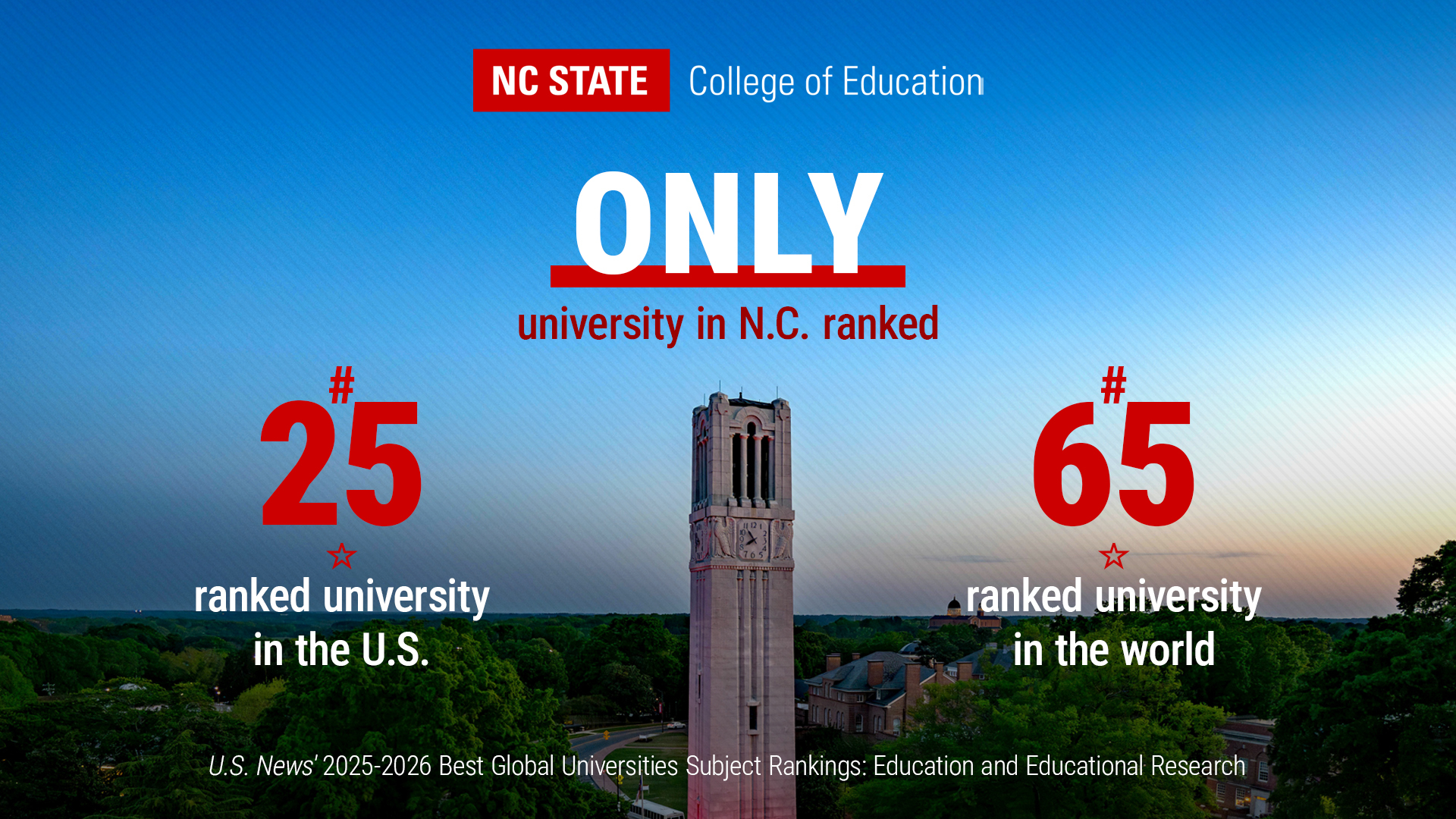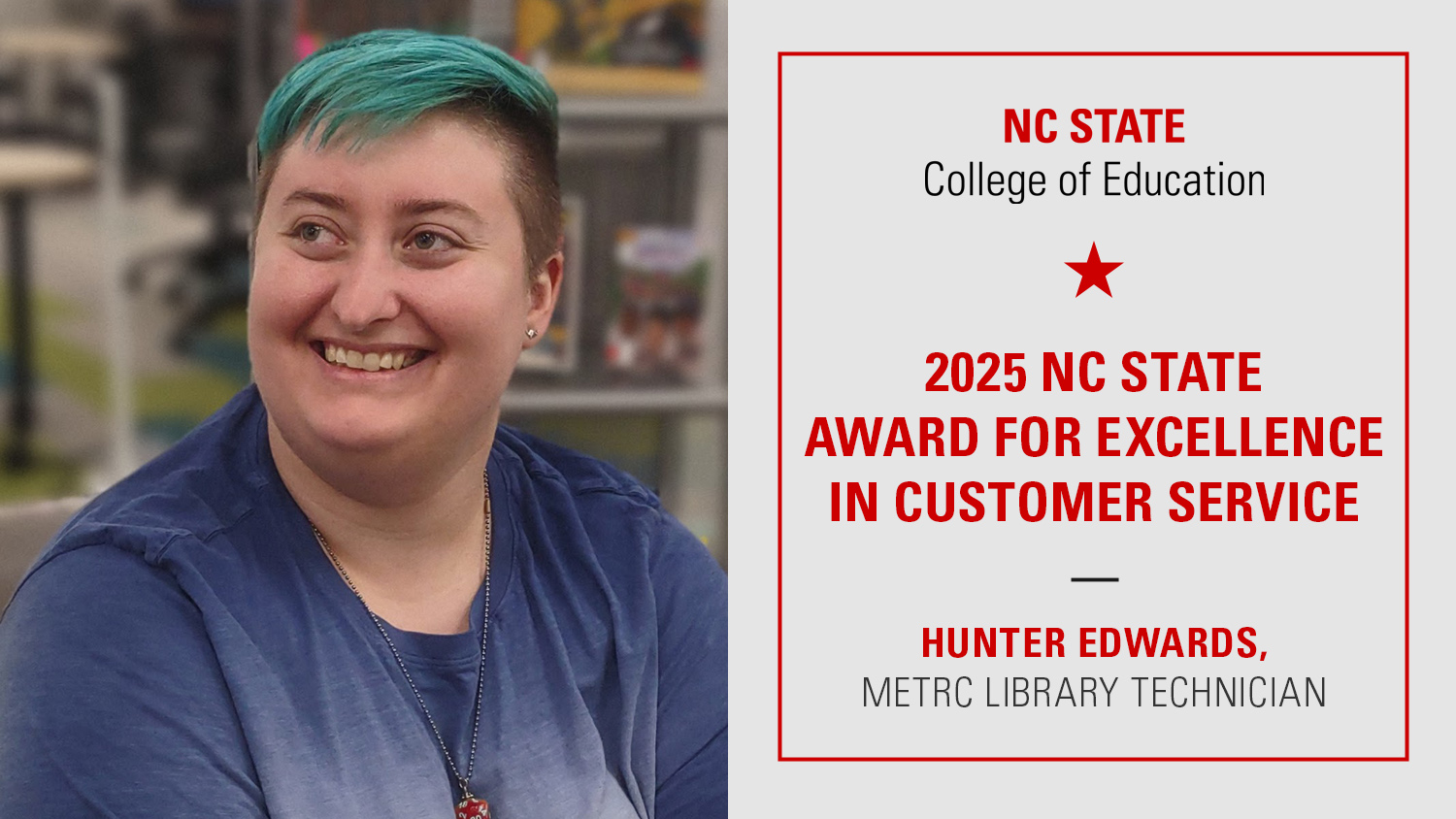Friday Institute Selects 2018 Graduate Student Fellows
This year’s Friday Institute Graduate Student Fellows are researching topics that will make a difference for North Carolinians. Whether dedicating time to providing access to education for all students, protecting people impacted by hazardous weather or improving the educational experiences of all learners, each fellow is doing his or her part to better people’s lives, sometimes despite adversity.
Each year, the Friday Institute for Educational Innovation Executive Director selects a few graduate students to become Friday Institute Graduate Student Fellows. Fellows are nominated by Friday Institute faculty fellows or directors and are selected for their strong record of academic achievement and service to students and educators. They must be an advanced graduate student at NC State University who is beginning his or her dissertation and has been actively engaged in the Friday Institute’s work. Fellows receive $2,000 to support their research.
Learn more about each of the 2018 Friday Institute Graduate Student Fellows below.
Bita Akram is a PhD student in computer science who has worked on the Friday Institute’s ENGAGE project for the past two years. She is doing groundbreaking work in K-12 computational thinking with game-based learning by assessing students’ problem-solving strategies. Akram has been instrumental in the design and execution of the project’s components in middle schools in Wake and Durham counties and has led authorship and contributed work on numerous conference papers, including first author on a paper, Improving Stealth Assessment in Game-based Learning with LSTM-based Analytics, this year at the Educational Data Mining conference, which had a 15% acceptance rate. This fellowship will allow Akram to participate in conferences that are directly related to her research or can help broaden her perspective and bring various ideas to her field.
“As computational thinking and programming have prevalently become an important skill for academia and workforces, my research helps to bring computational thinking into classrooms and provide access for all students,” Akram says.
Akram’s advisors, Dr. James Lester and Dr. Eric Wiebe, nominated her for this award. Dr. Wiebe is a Senior Faculty Fellow at the Friday Institute.
“She epitomizes what we’re attempting to do here at the Friday Institute–really bringing not only multidisciplinary teams together but bringing multidisciplinary individuals into those teams,” Dr. Wiebe says. “[Bita] can code switch between the education world and the high-tech world.”
Dr. Wiebe says he admires Akram not only for her multidisciplinary work but also for the obstacles and circumstances she’s overcome to be at NC State and do her research. Akram came to NC State from Iran and has not been able to go home or see her family since moving to North Carolina.
“[She’s] one of the great success stories and one of the reasons why I feel so good about supporting her,” Dr. Wiebe says. “Here is a young woman who has come from a country and a culture that does not encourage women doing this sort of work. Against all these odds–all these people telling her she’s not supposed to be here, she’s not supposed to be doing this work–she is still forging her way.”
Taylor Harrison is a PhD student in Teaching and Learning STEM with a focus in mathematics and statistics education. In 2016, he was awarded the 4-year Scholar Leader Fellowship, and his recently published article on iPads in the mathematics classroom appears in the International Journal of Education in Mathematics, Science and Technology. Harrison actively contributes to research and development across several projects for the Hub for Innovation and Research in Statistics Education (HI-RiSE) team at the Friday Institute, especially the ESTEEM (Enhancing Statistics Teacher Education through E-Modules) project. This award will give him the opportunity to disseminate his work with the Friday Institute, which is crucial to his research.
“Sharing our research at conferences allows us to accomplish several goals,” Harrison says, “including helping other researchers in their development of teacher education materials, particularly in online courses; increasing awareness of these free online materials; and partnering with teacher educators, training them to use these materials, and in turn, receiving field-testing data, allowing us to continually improve the materials.”
Disseminating resources for math educators is critical, as many are not prepared to teach statistics.
“Many mathematics teachers are ill-prepared to teach statistics, and many teacher educators are unsure of the best ways to prepare these teachers to teach statistics,” Harrison says. “Our curricular materials allow these teacher educators to take pre-designed, research-backed materials, easily import them into their existing course, adapt them to their needs, and as a result, improve the preparation that these teachers receive to teach statistics.”
Dr. Hollylynne Lee nominated Harrison for this award. Dr. Lee is a Senior Faculty Fellow at the Friday Institute.
“Taylor is an outstanding developing scholar who understands how to apply strong theoretical lenses to tackling very practical issues in education,” Dr. Lee says. “He has worked with me on two NSF-funded projects at the Friday Institute that have illustrated how well he engages in different aspects of the life cycle of a research project. He is thoughtful, meticulous and a joy to work with.”
Rebecca Ward is a PhD student in Teaching and Learning STEM with a focus in science education. She works as a climatologist and is investigating public understandings of drought and water resources. This fellowship will provide Ward with opportunities to better execute her research, including improving science information communication channels for North Carolina sectors to build statewide drought resilience.
“Though significant strides have been made in recent decades in forecasting capabilities and our collective understanding of the science of weather and climate, when it comes to hazardous weather, there are still hurdles to overcome to ensure all people are protected,” Ward says. “ It’s exciting to be doing research that can make a difference, and I know this award will help me on those steps.”
Ward’s advisor, Dr. Gail Jones, nominated her for this award. Dr. Jones is a Senior Faculty Fellow at the Friday Institute.
“Rebecca deserves this award because she is an excellent scholar and researcher who is interested in the interface between science education and meteorology,” Dr. Jones says. “She applies her research interests to real-world problems with a goal of making a difference in the lives of the people of NC.”
This article was originally posted on the Friday Institute website.
- Categories:


